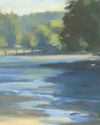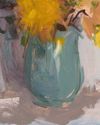
When tutoring workshops and art breaks, I’m often asked a similar question: when faced with a complex subject, how does one decide which elements to include in a painting, and which ones to leave out?
Though I’m often asked in relation to landscapes, the question applies across all genres of painting. And thankfully, the answer may be far simpler than one might think.
The easiest way to make the decision about what to put in and what to leave out is to decide as early as possible what the painting is going to be about. I’m not suggesting that it’s as easy as simply deciding that the painting will be a portrait of a friend or harbour scene – that is the subject. I’m suggesting that we, as artists, should have a clear understanding of the reasons behind why a painting is being made.
Ask yourself: why am I painting this subject at this moment in time? Once you have decided this, it’s much easier to choose elements that support the meaning behind the painting while also rejecting others.
For example, take a simple beach scene. This is our subject. By including a lone figure on the beach, however, the artist could attempt to convey a sense of solitude through the painting. This is what the painting is about. However, if several figures or groups of people were included then the meaning behind the painting would be altered, that sense of solitude would be lost, and it would become a different painting. As such, a clearly defined reason for making the painting is key when it comes to deciding what’s in and what’s out.
CASE STUDY
BELOW ARE SIX STAGES OF A SINGLE PAINTING WITH AN EXPLANATION OF THE DECISIONS MADE AT EACH POINT
1. REFERENCE PHOTO
This story is from the November 2020 edition of Artists & Illustrators.
Start your 7-day Magzter GOLD free trial to access thousands of curated premium stories, and 9,000+ magazines and newspapers.
Already a subscriber ? Sign In
This story is from the November 2020 edition of Artists & Illustrators.
Start your 7-day Magzter GOLD free trial to access thousands of curated premium stories, and 9,000+ magazines and newspapers.
Already a subscriber? Sign In

Still life IN 3 HOURS
Former BP Portrait Award runner-up FELICIA FORTE guides you through a simple, structured approach to painting alla prima that tackles dark, average and light colours in turn

Movement in composition
Through an analysis of three masterworks, landscape painter and noted author MITCHELL ALBALA shows how you can animate landscape composition with movement

Shane Berkery
The Irish-Japanese artist talks to REBECCA BRADBURY about the innovative concepts and original colour combinations he brings to his figurative oil paintings from his Dublin garden studio

The Working Artist
Something old, something new... Our columnist LAURA BOSWELL has expert advice for balancing fresh ideas with completing half-finished work

Washes AND GLAZES
Art Academy’s ROB PEPPER introduces an in-depth guide to incorporating various techniques into your next masterpiece. Artwork by STAN MILLER, CHRIS ROBINSON and MICHELE ILLING

Hands
LAURA SMITH continues her new four-part series, which encourages you to draw elements of old master paintings, and this month’s focus is on capturing hands

Vincent van Gogh
To celebrate The Courtauld’s forthcoming landmark display of the troubled Dutch master’s self-portraits, STEVE PILL looks at the stories behind 10 of the most dramatic works on display

BRING THE drama
Join international watercolour maestro ALVARO CASTAGNET in London’s West End to paint a dramatic street scene

Serena Rowe
The Scottish painter tells STEVE PILL why time is precious, why emotional responses to colour are useful, and how she finds focus every day with the help of her studio wall

Bill Jacklin
Chatting over Zoom as he recovers from appendicitis, the Royal Academician tells STEVE PILL about classic scrapes in New York and his recent experiments with illustration